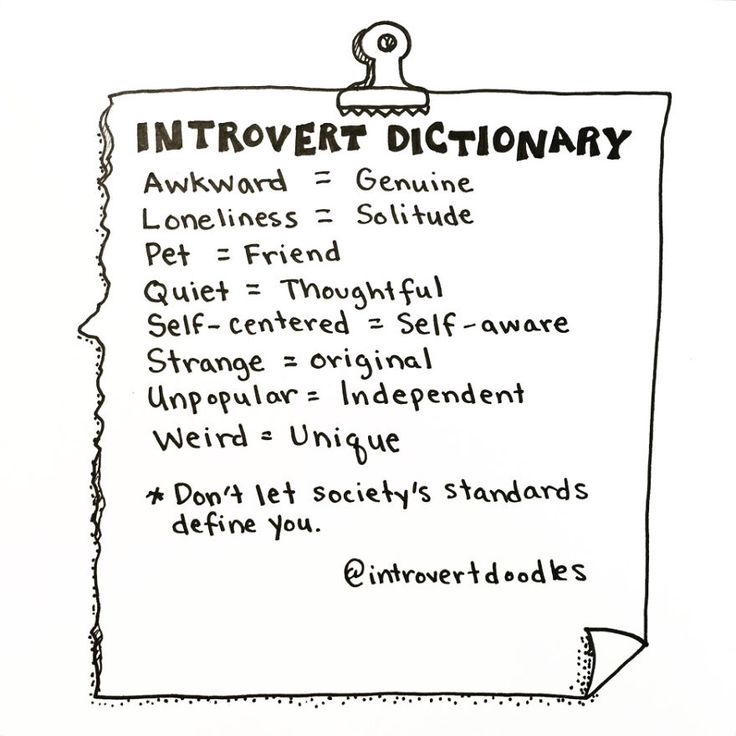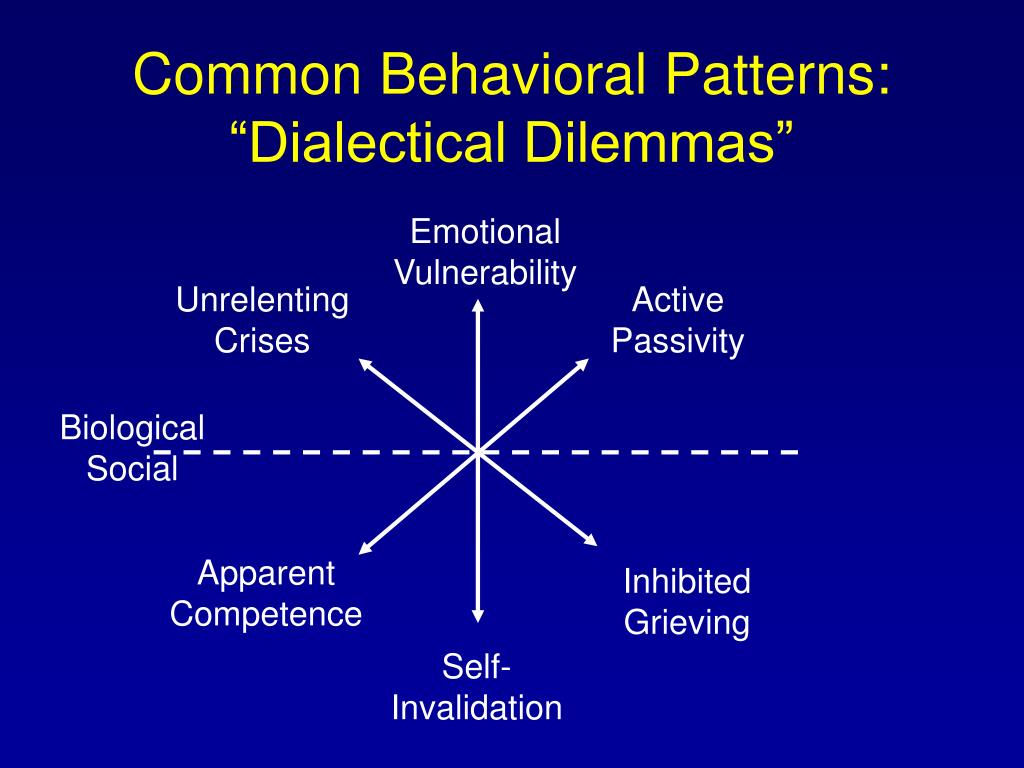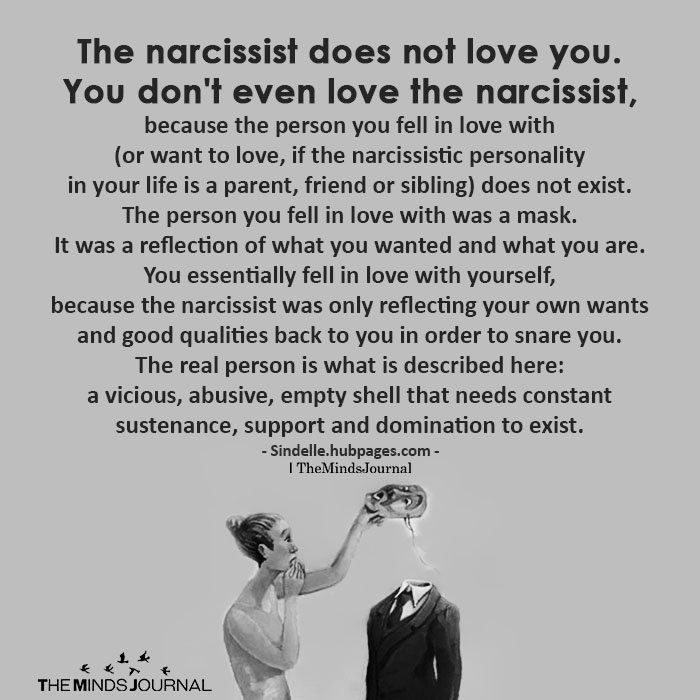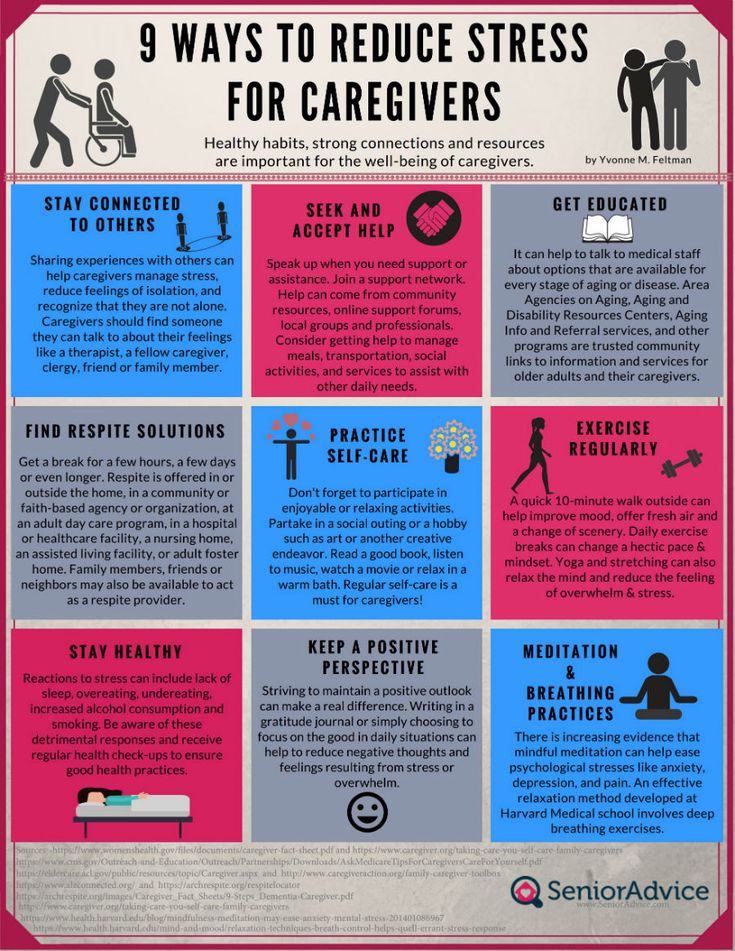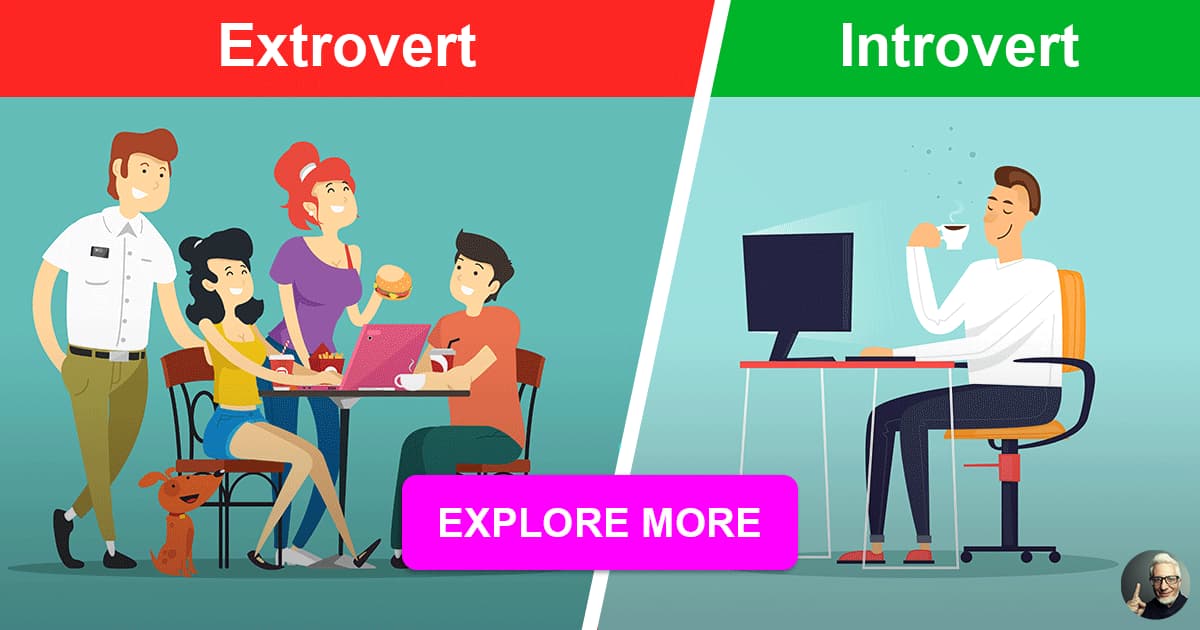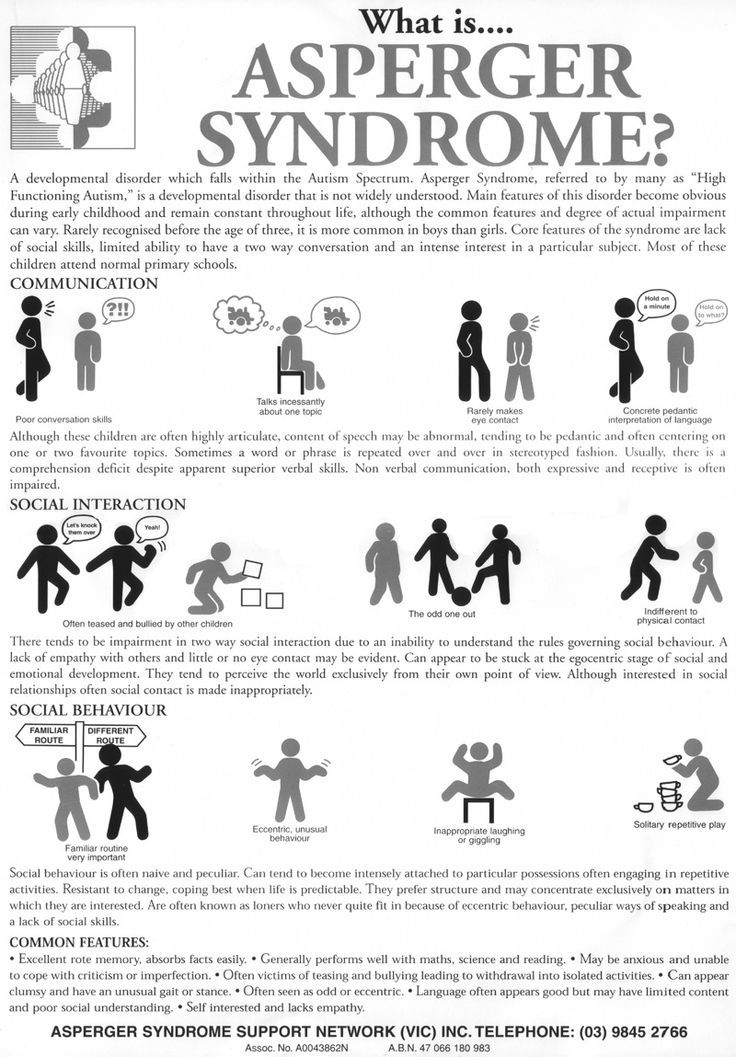Things to know when dating an introvert
Dating an introvert? Here are things you must know
relationships
Published on Aug 12, 2022 09:00 PM IST
If you are looking for a long-term relationship, an introvert can be a good choice as they make for loyal and loving partners(Pixabay)ByParmita Uniyal
Have you fallen head over heels in love with an introvert but still trying to figure them out? Dating an introvert can be full of surprises as they may appear shy or aloof in the beginning but as you begin to know them, they may amaze you with their insights, creativity or even brilliance. Not all introverts can be put in the same category and like all relationships, there are chances things may not work out in the end, but to understand a resered person, one needs to spend a considerable amount of time with them. (Also read: Is your partner ignoring you? Tips to deal with an unresponsive partner)
If you are looking for a long-term relationship, an introvert can be a good choice as they make for loyal and loving partners according to relationship experts. They may not be conversation-starters, but they may have the best things to say. Considering they speak less and think more, they will probably not hurt you and be sensitive to your feelings.
Dr. Chandni Tugnait is M.D. (Alternative Medicines), Psychotherapist, Life Coach, Business Coach, NLP Expert, Healer, Founder & Director – Gateway of Healing shares a few things one should know about dating an introvert:
1. They're not necessarily shy
Just because someone is introverted doesn't mean they are shy. In fact, many introverts are quite outgoing and sociable, they just prefer smaller groups or one-on-one interactions.
2. They need time to recharge
If you're dating an introvert, don't take it personally if they need some time alone after a long day or night out. It's not true that introverts don't like people, they just need some time to themselves to recharge.
3. They're great listeners
One of the best things about dating an introvert is that they're usually great listeners. If you need to talk or vent about something, they're more than happy to lend a listening ear.
If you need to talk or vent about something, they're more than happy to lend a listening ear.
4. They're deep thinkers
Introverts are often deep thinkers and can be very insightful. If you're looking for someone to have a meaningful conversation with, an introvert is your type.
5. They might not be the life of the party
If you're looking for someone who's always up for a good time, an introvert might not be the one for you. They're not necessarily party-poopers, they just usually prefer quieter activities.
6. They're often creative
Since introverts tend to be deep thinkers, they're often quite creative as well. If you're looking for someone to help you with a project or come up with new ideas, an introvert is your go-to person.
7. They're usually good at reading people
Since introverts are often good listeners and observers, they are usually quite good at reading people. If you need someone to give you honest feedback or help you understand someone better, check with an introvert.
8. They might not be the best at small talk
Since introverts usually prefer deeper conversations, they might not be the best at small talk. If you are looking for someone to make idle chit-chat with, an introvert might not be your type.
9. They're often loyal friends
Introverts often prefer close relationships and tend to be very loyal friends.
10. They make great partners
If you're looking for a deep and meaningful relationship, look no further than an introvert. They might not be the life of the party, but they'll be there for you when you need them the most.
If you keep these things in mind, dating an introvert can be a rich and rewarding experience despite a few challenges, says Dr Tugnait.
Follow more stories on Facebook & Twitter
SHARE THIS ARTICLE ON
Topics
dating personal relationships relationship advice + 1 more
dating personal relationships relationship advice
Personalise your news feed. Follow trending topics
Follow trending topics
How To Date An Introvert When You’re An Extrovert, According To Experts
Life
by Natalia Lusinski
BDG Media, Inc.
When it comes to dating, you may seek out someone who’s similar to you in both personality and character. However, what happens when you’re an extrovert and they’re an introvert, or vice-versa? If you don’t understand the intricacies of each personality type, you may have more conflict in your relationship than is necessary. So, it’s best to know how to date an introvert in order to avoid potential personality clashes.
“Introverts and extroverts can create beautifully balanced, whole, and healthy partnerships together,” Lisa Olivera, Licensed Marriage and Family Therapist in Oakland, CA, tells Bustle. “It takes honoring each other’s needs and learning about how you each best function in the world.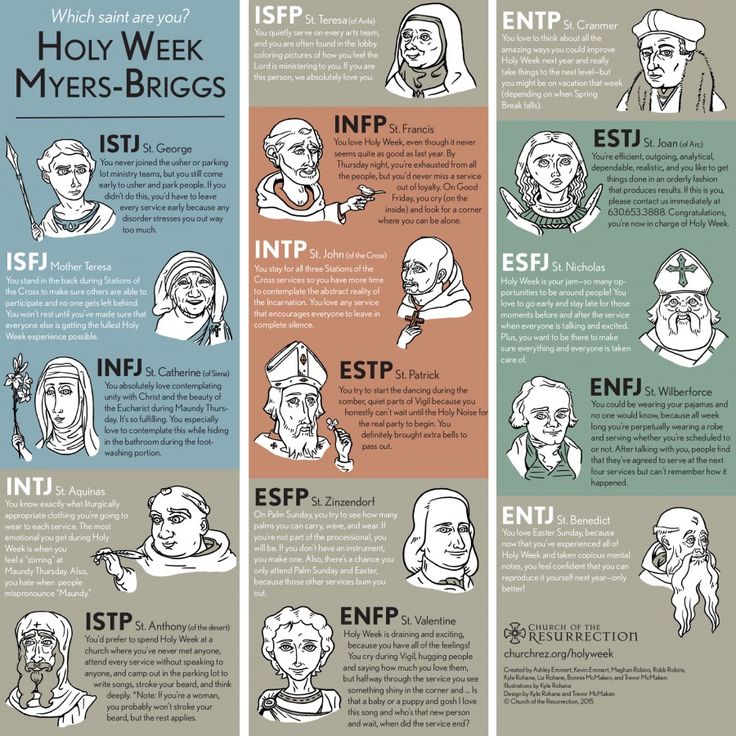 ” She also thinks it requires practicing patience.
” She also thinks it requires practicing patience.
“With the right tips and understanding, blending these two personality traits can lead to wonderful relationships,” she says.
However, to get to that level of understanding with one another, Olivera suggests learning what type of extrovert you are, as well as what type of introvert your partner is. One way to do so is through the Meyers-Briggs test so you can figure out your personality type. You can either do the test online or with someone like a therapist. “When we not only learn about ourselves, but also about our partner, we gain a better sense of how we work as individuals,” she says. “In turn, we learn how we can support our partner based on their traits and natural ways of being in the world.”
That said, here are more tips for dating an introvert if you’re an extrovert, according to experts.
1
Be Supportive
Andrew Zaeh for Bustle
If you’re an extrovert, a full-on people person who gets more energy around others versus alone, it may be difficult to acknowledge that your introvert partner is not wired the same way. “By understanding what our partner needs in order to function well as a human, we can do things to support them,” Olivera says. She says this may include giving them space alone, asking if they want support, and reminding them you are there for them.
“By understanding what our partner needs in order to function well as a human, we can do things to support them,” Olivera says. She says this may include giving them space alone, asking if they want support, and reminding them you are there for them.
“Furthemore, you can offer to partake in activities together or separately, such as taking different cars so that each person’s needs can be met,” Olivera says.
2
Don’t Judge Them
Andrew Zaeh for Bustle
Dan Neuharth, PhD, Licensed Marriage and Family Therapist, founder of DrDanMFTCounseling.com, and author of If You Had Controlling Parents: How to Make Peace with Your Past and Take Your Place in the World, says it’s best not to be judgmental. “Try not to judge or change the other person — introverted and extroverted tendencies are often set at birth,” he tells Bustle. “Instead, appreciate what the other person *does* offer. Introverts can offer extroverts the opportunity to slow down, reflect, self-soothe and increase introspection.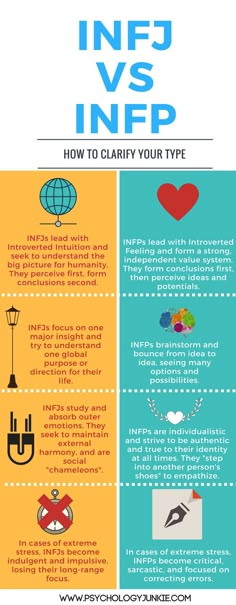 Extroverts can offer introverts the opportunity to try new experiences, meet new people, and grow in new ways.
Extroverts can offer introverts the opportunity to try new experiences, meet new people, and grow in new ways.
3
Respect Their Preferences & Don’t Take Them Personally
Andrew Zaeh for Bustle
If you haven’t dated an introvert before, you may take it personally when they need space or alone time. But you shouldn't. On top of which, every introvert is different, so one may need more alone time than another. “Respect your partner’s preferences while also respecting your own,” Olivera says. “For example, if you are extroverted and want to attend a party, but your introverted partner is feeling drained, have a conversation about meeting your socializing needs, but also fulfilling their needs of wanting to stay home.”
She stresses that if your introverted partner needs time for themselves, respect that need by not taking it personally. “The more partners can practice recognizing and honor the needs of their partners AND themselves, the more satisfied and fulfilling their relationship will be,” Olivera says.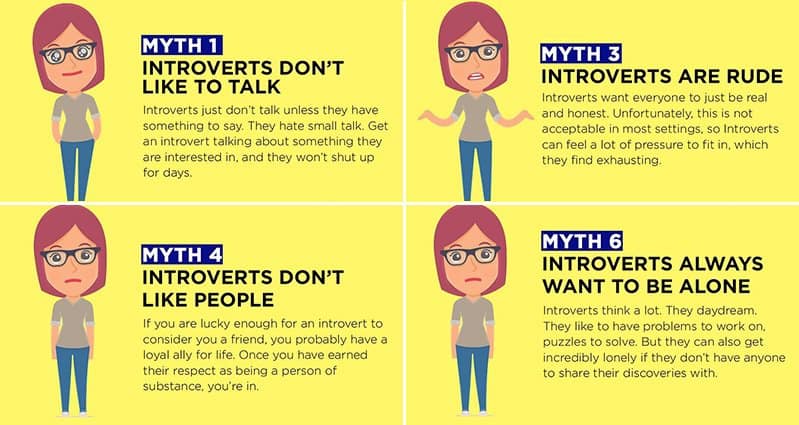
Dr. Dan thinks so, too. “Introverts need alone time and quiet time, but this doesn’t mean they don’t want you,” he says. He recommends letting them recharge in their own way. “If you’re an introvert, it’s OK to say to your partner, ‘I am overstimulated and need some quiet time.’ Similarly, an extrovert can say, ‘I am restless and need more stimulation.’ How else can two people with such different personality styles know how the other is feeling unless they tell each other?”
4
Have A Safe Word (Or Phrase)
Andrew Zaeh for Bustle
Adam C. Earnheardt, Ph.D., Chair and Professor of the Department of Communication at Youngstown State University is an extrovert and has been with his introvert wife for more than 20 years. Keeping lines of communication open is important, he says, which is something that may be a little difficult for new couples. “The trick for me has always been to listen to my wife’s needs about crowded spaces and public events,” he tells Bustle.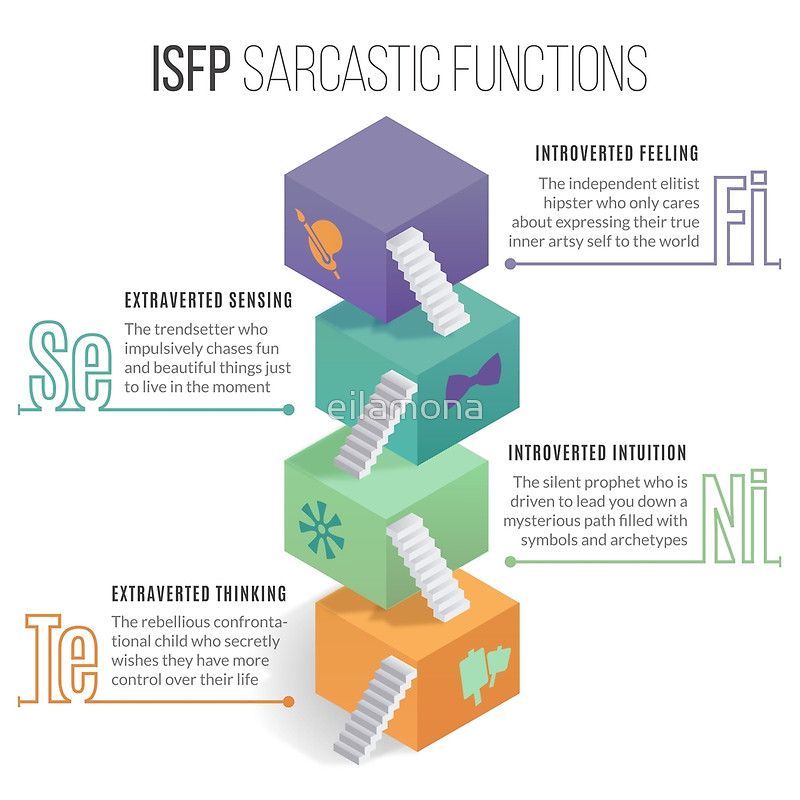 “It took me a while to learn, but it’s actually physically and emotionally draining for her to be ‘on’ for other people, as it is for most introverts.”
“It took me a while to learn, but it’s actually physically and emotionally draining for her to be ‘on’ for other people, as it is for most introverts.”
Their solution? Having a safe word. “When we’re out in public, and she’s feeling overwhelmed by people and conversations, she’ll use our predetermined ‘excuse’ for bolting,” he says. He says after dating an introvert for a while, you might not need a safe word. “Instead, you simply pick up on the nonverbal cues, or that ‘look’ your partner gives, and you know it’s time to pack it in for the night,” Dr. Earnheardt says.
5
Don’t Be Afraid Of Their Silence
Ashley Batz/Bustle
Extroverts usually don’t love silence, but it’s often an introvert’s best friend. “Extroverts like it when introverts express enthusiasm and gratefulness, so extroverts may interpret silence as disapproval or a lack of enthusiasm,” Dr. Dan says. “But introverts often need more time than extroverts to mull over important issues.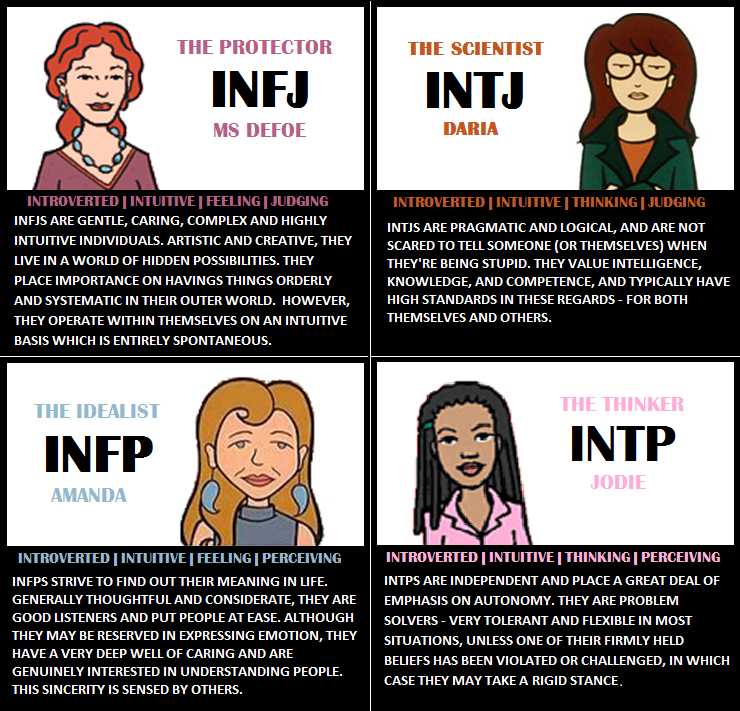 Try not to let this frustrate you.”
Try not to let this frustrate you.”
6
Highlight Your Introverts Partner’s Strengths
Andrew Zaeh for Bustle
There are strengths to being both an introvert and an extrovert, and it helps to remind yourself of your partner’s strengths. “For example, if you admire your partner’s ability to be in solitude without feeling lonely, point it out to them,” Olivera says. “Similarly, they may recognize how great you are at being around groups of people without getting depleted.”
She says that when you highlight differences as strengths instead of barriers, the differences becomes less important. “Instead, the recognition of our partner and their needs becomes the focus,” she says. “From this space, relationships can flourish and grow in a healthy and supportive way.”
7
You May Have To Ask Them Questions More Often Than Not
Andrew Zaeh for Bustle
As an extrovert, you probably have no issue with talking to your partner nonstop, about everything and anything, sharing your deepest, darkest feelings. However, that may not be the case when it comes to how your introverted significant other communicates with you. “Many introverts share more in response to questions rather than volunteering their thoughts, so ask away,” Dr. Dan says. “And, by allowing an introvert time, you are more likely to get deeper and more authentic responses than if you apply pressure.”
However, that may not be the case when it comes to how your introverted significant other communicates with you. “Many introverts share more in response to questions rather than volunteering their thoughts, so ask away,” Dr. Dan says. “And, by allowing an introvert time, you are more likely to get deeper and more authentic responses than if you apply pressure.”
8
Compromise
Andrew Zaeh for Bustle
Whether or not you’re dating an introvert, compromising in relationships is key, and Dr. Dan suggests maximizing ways to do so with your introverted partner. “Seek compromise,” he says. “For example, take two cars (or Ubers or Lyfts) to social gatherings. This will allow the introvert to leave early if desired, which is better than not going at all. Look for win-wins.”
Dr. Earnheardt also thinks compromising is essential. “As extroverts, the activities we choose on dates can’t always be about us,” he says. “So be cognizant of the activities you suggest to your introverted date, being sure to pick an activity they’ll enjoy, like a hike in the park, a quiet dinner at your apartment, or talking about a book you’ve both just read. On the flip side, I promise, the right ever-observant introverted partner will see the effort you’re making and pay it back.”
On the flip side, I promise, the right ever-observant introverted partner will see the effort you’re making and pay it back.”
9
Have Couples Time
Hannah Burton/Bustle
No matter how much your introvert partner values their solitude, it’s also important that you continue to spend time together. “Make sure to make couples time,” Dr. Dan says. “Extroverts may need to do social things on their own just as introverts may need alone time. But don’t forget why you are together. Make time to give each other undivided attention.”
Dr. Earnheardt agrees, adding that it’s good if you and your introverted partner know what leads to intimacy. He says that while extroverts thrive in parties and public settings, meeting new people and experiencing new things, introverts see these activities as energy drains, sometimes to the point of near exhaustion. “Unfortunately, as extroverts, we don’t always think to talk about those potential energy drains with our partners,” he says. But he adds that talking about those limits may lead to great satisfaction as a couple.
But he adds that talking about those limits may lead to great satisfaction as a couple.
“Plus, spending time alone as a couple, in quiet spaces, tend to be less physically, mentally, and emotionally demanding, and can lead to a greater levels of intimacy.”
As you can see, there are many ways to navigate an extrovert-introvert relationship. “I really think these kinds of pairings are best suited for long-term relationship success,” Dr. Earnheardt says. “All it takes a lot of good conversation and negotiation.” Of course, the bottom line is, communication is everything, and the sooner you master the communication style you and your introverted partner have, the better, though it may take some practice, which is completely OK.
Academy |
Networking for People Who Hate Networking: A Field Guide for Introverts, the Overwhelmed, and the Underconnected
Devora Zak
Berrett -Koehler Publishers © 2010
The author of the book calls herself "an introvert to the core. " She prefers solitude to the bustle of the collective, and to the noise of nightclubs and parties - an environment conducive to calm reflection. She is not drawn to socializing with colleagues after a hard day's work. Nevertheless, Devora Zach is an expert in making acquaintances: under her guidance, introverts not only learn to establish business and personal contacts, but also begin to have a keen interest in this process. Whether the techniques and recommendations described in the book will help you will depend on how pronounced an introvert you are. nine0011
" She prefers solitude to the bustle of the collective, and to the noise of nightclubs and parties - an environment conducive to calm reflection. She is not drawn to socializing with colleagues after a hard day's work. Nevertheless, Devora Zach is an expert in making acquaintances: under her guidance, introverts not only learn to establish business and personal contacts, but also begin to have a keen interest in this process. Whether the techniques and recommendations described in the book will help you will depend on how pronounced an introvert you are. nine0011
Introverts and extroverts
Are you an introvert or an extrovert? Introverts tend to be thoughtful, focused, and self-reliant, while extroverts tend to be outgoing and open-minded people who enjoy the company of others. There are many misconceptions about these two opposing personality types. For example, introverts are credited with qualities such as unfriendliness, sullenness, and isolation.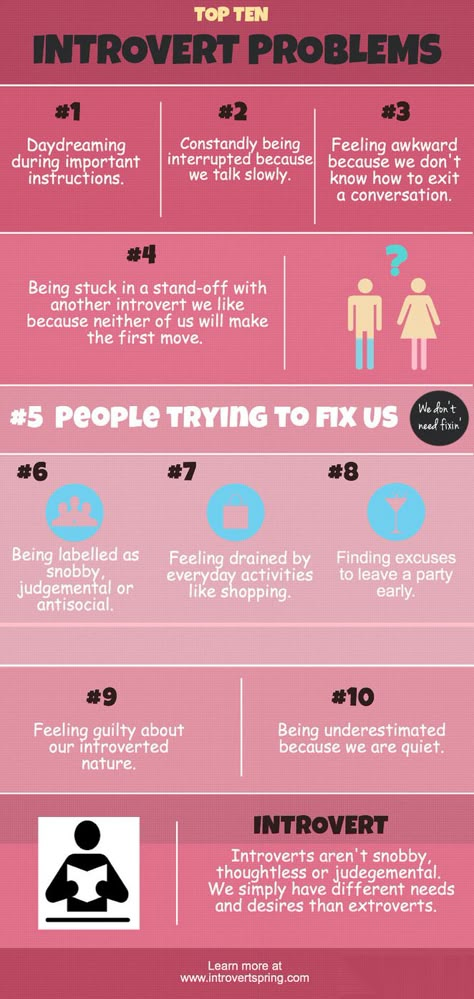 Another persistent mass delusion is the idea that introverts are supposedly too shy, while extroverts, on the contrary, easily converge with people. In fact, the opposite is often true. In addition to these two personality types, there are also “centroverts” who occupy an intermediate position between introverts and extroverts. Communication is often difficult for introverts, as many of them feel uncomfortable keeping small talk. Nevertheless, a business person cannot do without the ability to make useful contacts. Everyone should be able to meet new people, regardless of what psychological type they belong to. nine0003
Another persistent mass delusion is the idea that introverts are supposedly too shy, while extroverts, on the contrary, easily converge with people. In fact, the opposite is often true. In addition to these two personality types, there are also “centroverts” who occupy an intermediate position between introverts and extroverts. Communication is often difficult for introverts, as many of them feel uncomfortable keeping small talk. Nevertheless, a business person cannot do without the ability to make useful contacts. Everyone should be able to meet new people, regardless of what psychological type they belong to. nine0003
Being an introvert doesn't mean you don't like dating. Learn to enjoy this process. To do this, you need to develop the skills of preparation for a conversation, in-depth attention and dosed communication. Establishing an emotional connection with another person is the main condition for a successful acquaintance. These three skills are of particular importance for introverts, since it is this type that most often has the psychological qualities that help to get along with strangers.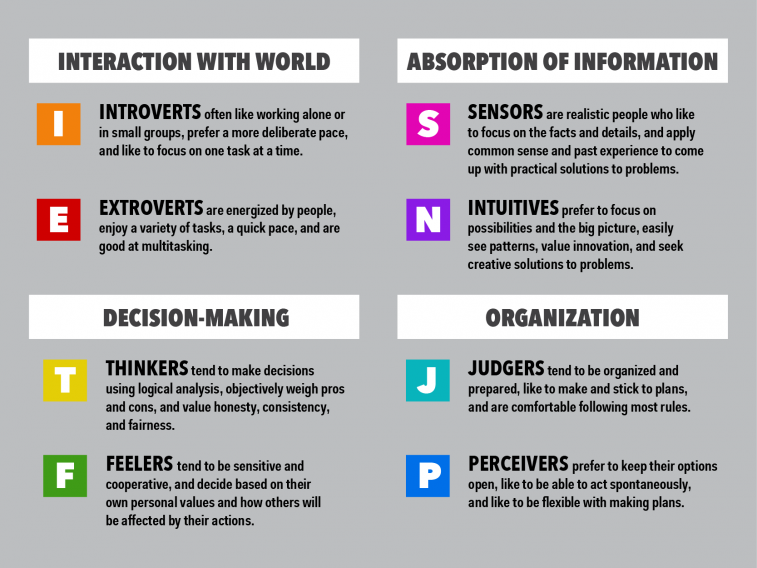 nine0003
nine0003
• Preparing. Introverts first think and then speak. They tend to think things over carefully, they need time to gather their thoughts. The attention of an introvert is directed to their own experiences, and not to what is happening around. Before doing anything, introverts should prepare well: build tactics of behavior, think over options for their actions and set clear goals. These features of behavior help to successfully make acquaintances.
• Deep attention. Introverts prefer to focus deeply on what they are doing. They are picky about what to spend their time on. It is important for introverts to understand who or what they are dealing with. For example, being present at a conference, an introvert will not communicate with everyone in a row. Instead, he will focus on one or two interlocutors and try to get to know them as best as possible. This attitude to communication facilitates the establishment of strong contacts.
• Dosing of communication. nine0015 The attention of extroverts is directed to the outside world and the people around them, while introverts are most interested in their own experiences. By attending collective events, introverts get to know and communicate with people of interest to them, then take a break in order to resume communication with fresh forces after some time. This tactic is ideal for successful dating.
nine0015 The attention of extroverts is directed to the outside world and the people around them, while introverts are most interested in their own experiences. By attending collective events, introverts get to know and communicate with people of interest to them, then take a break in order to resume communication with fresh forces after some time. This tactic is ideal for successful dating.
The main obstacle to communication
A special psycho-physiological reflex called “fight or flight” most often prevents us from successfully making acquaintances. It was developed by primitive people as a defensive reaction to an unexpected encounter with predatory animals. This mechanism instantly turned on in extreme situations, and thanks to it, our ancestors saved their lives. Today we live in completely different conditions, but the “fight or flight” response can work for a modern person in any situation that is unfamiliar to him - for example, when attending social events. nine0003
nine0003
At such moments, breathing quickens, and blood drains from the brain and rushes to the arms and legs, so that a person has time to fight back an attacker or flee. Such drastic physiological changes are inevitably reflected in behavior. In a state of fear, people are tense, anxious, and unable to think clearly. It is for this reason that many of us do not like to attend conferences or other events with large numbers of strangers.
To turn off the fight-or-flight response, start breathing deeply and evenly - this will increase blood circulation and help you calm down. The panic will subside and you will regain the ability to think clearly. Use this technique whenever you feel uncomfortable talking to others. nine0003
Lessons from extroverts
Extroverts have their own dating methods. Introverts can learn valuable lessons by observing their behavior, but often doing the opposite. The strength of extroverts is their ability to conquer others with their wit, and introverts - the ability to make interesting observations. Most often, extroverts meet new people using the following methods:
Most often, extroverts meet new people using the following methods:
• Ease of networking. In an unfamiliar company, it is not difficult for extroverts to introduce themselves and seize the initiative in a conversation. Introverts, on the other hand, prefer to silently observe others. Use this tactic when attending group events. Pay close attention to the people around you and listen to what they have to say. Later, you can use the collected information to establish communication with these people. nine0003
• Self-promotion. Extroverts, unlike introverts, like to be the center of attention. However, instead of talking about yourself all the time, as extroverts often do, ask those around you interesting questions, engaging them in meaningful conversation.
• Constant communication. Extroverts love to be in the company of other people and use every opportunity to socialize. Introverts, on the other hand, prefer solitude to noisy society. Keep this in mind when planning your visit to any event. Take as much time as you need to meet new people so you don't feel uncomfortable. nine0003
Take as much time as you need to meet new people so you don't feel uncomfortable. nine0003
Relaxation techniques
There are other ways for introverts to make meeting new people easier. For example, pre-registering for a public event can help you feel more confident. A ready-made name badge will save you from the awkwardness associated with the need to inscribe it with your own hands. If you have a group event in the evening, finish work early so that you have time to relieve mental stress. Ask a friend or acquaintance to keep you company and try to arrive at the place a little earlier than the appointed time. nine0003
Before entering the room where the event will take place, pause at the mirror and make sure that everything is in order with your appearance. If you have to line up at the bar or at the printed material tables, try starting a conversation with those in front of you or behind you. Be friendly and open with everyone. Stop thinking about yourself for a while and pay attention to those around you. Periodically retire somewhere to retire and recuperate. Prepare “exit routes” in advance so that you can leave the event at any time. nine0003
Periodically retire somewhere to retire and recuperate. Prepare “exit routes” in advance so that you can leave the event at any time. nine0003
The golden rule of dating
The golden rule of successful dating is: Treat others the way they would like to be treated. Develop a sensitivity to the interests and communication style of other people. Find out what they are, what they like and what they don't. Be ready to adapt to the interlocutors, even if it means behaving in a manner unusual for you. Don't lock yourself in. Make strangers feel comfortable in your presence, and then start adjusting to their mood and behavior. All this will require a certain concentration of attention, and thanks to this you will think less about your experiences, stop carefully weighing every word and feel more comfortable. People around are drawn to a person who knows how to easily get to know each other. nine0003
Choosing the right format for the event
Even if you don't like the process of making friends, there are certain forms of group activity that you may not be put off by. In particular, public events of a certain format that have clear goals, such as lectures, professional seminars, various training courses, meetings of public organizations, and so on, open up excellent opportunities for meeting new people. Many people often make the most useful acquaintances at such events. nine0003
In particular, public events of a certain format that have clear goals, such as lectures, professional seminars, various training courses, meetings of public organizations, and so on, open up excellent opportunities for meeting new people. Many people often make the most useful acquaintances at such events. nine0003
Find out for yourself which forms of collective activity appeal to you and why. Then consider which of these activities are suitable for making acquaintances. Start visiting them, clearly understanding the purpose for which you are doing this. For example, if you are an electrical network specialist, find a community or club of people working in this field. Attend their meeting and, if you like it, consider becoming one of the leaders of this community.
Smile and the world will smile back at you
Smiling is one of the simplest and most effective ways to win people over. When you smile, you exude self-confidence. A smile encourages not only the person himself, but also everyone who surrounds him. This simple non-verbal gesture does not oblige you to be the first to start a conversation with strangers. Many people believe that introverts are unsociable and introverted. Smile more often, and then they may change their views and reach out to you themselves. By smiling, you begin to feel better about yourself, because our actions control our mood. nine0003
This simple non-verbal gesture does not oblige you to be the first to start a conversation with strangers. Many people believe that introverts are unsociable and introverted. Smile more often, and then they may change their views and reach out to you themselves. By smiling, you begin to feel better about yourself, because our actions control our mood. nine0003
This advice may not be to your liking. It is possible that you will feel like a hypocrite, smiling at everyone, or it may seem to you that smiling does not suit you. However, remember that your ability to smile depends on how successful you will make acquaintances. Smiling is one of the most effective communication techniques that requires almost no effort to apply.
Preparation
The better prepared you are for the social event, the more comfortable you will feel and the more successful you will be in networking. First of all, consider the question of what you will tell about yourself. List by points what information about your professional experience and personal life you are ready to share with your interlocutors.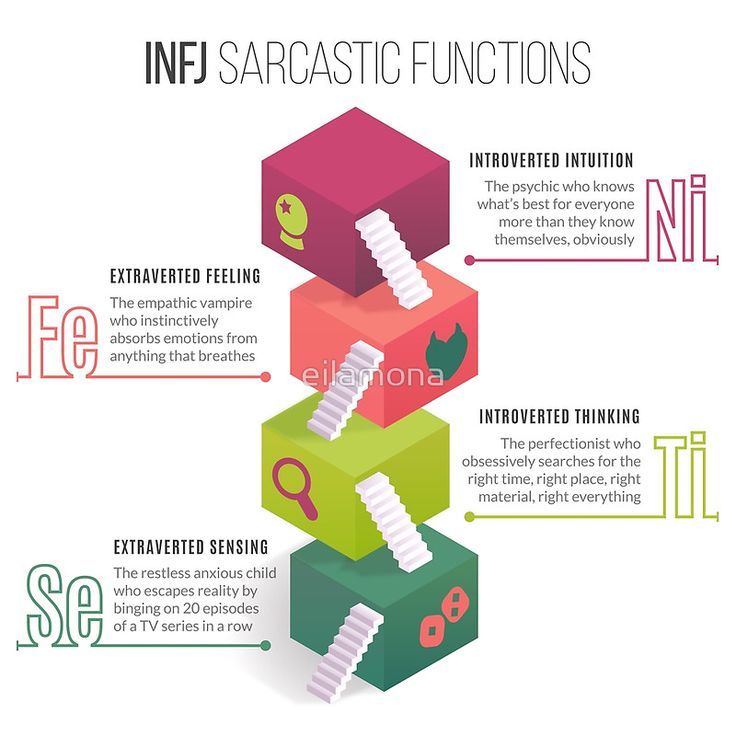 Make sure the information is concise, easy to understand, interesting, personal, and doesn't sound like a boast. When chatting with someone, look for topics or interests that connect you with that person. nine0003
Make sure the information is concise, easy to understand, interesting, personal, and doesn't sound like a boast. When chatting with someone, look for topics or interests that connect you with that person. nine0003
Be prepared to talk about what you do, where you work, what you enjoy
about your profession, what are your professional achievements. When it comes to personal information, you can tell others about your interests, hobbies, family members, where you come from, what you are proud of, and what your life goals are. Write this information down on paper and practice saying it out loud in front of a family member or friend. So you will learn how to convincingly talk about yourself even in a completely unfamiliar company. nine0003
How to organize an event that is comfortable for introverts
How to ensure that introverts do not feel uncomfortable participating in a social event? For starters, don't let extrovert organizers take over during the pre-planning phase. To prevent this from happening, hand out paper and pens to the organizers and ask them to write down all their ideas for the event program. This way you will be able to keep the discussion under control. If you allow the audience to lead the discussion out loud, extroverts will quickly take the initiative. nine0003
To prevent this from happening, hand out paper and pens to the organizers and ask them to write down all their ideas for the event program. This way you will be able to keep the discussion under control. If you allow the audience to lead the discussion out loud, extroverts will quickly take the initiative. nine0003
To make the event exciting, make sure that the name cards marking the places of the participants at the table contain interesting information about them, for example: “speaks three languages” or “golf master”. Place multi-colored markers next to the name cards and invite the participants to draw some symbolic drawing on the cards that characterizes them as a person. This will make it easier for those present to get to know each other.
An introvert who wants to learn how to make friends needs to set specific and constructive goals for himself. For example, this goal might sound like this: “In the next six months, I will participate in at least two social events.” Make sure that the achievement of the intended goals occurs strictly in accordance with the planned deadlines.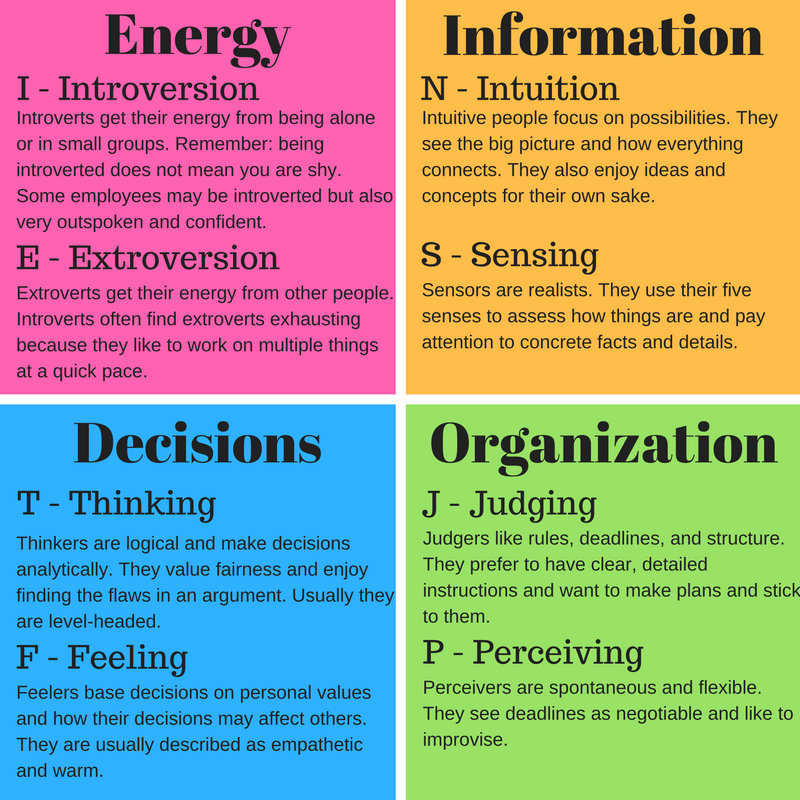 Set goals to achieve which you need to make some effort. Make sure they don't conflict with everything else you do. Plan in detail what exactly you will do in the initial stages in order to achieve what you have planned. Finally, determine how you are going to evaluate whether you are successfully developing your ability to make useful contacts. nine0003
Set goals to achieve which you need to make some effort. Make sure they don't conflict with everything else you do. Plan in detail what exactly you will do in the initial stages in order to achieve what you have planned. Finally, determine how you are going to evaluate whether you are successfully developing your ability to make useful contacts. nine0003
About the Author
Devora Zak is President of Only Connect Consulting.
How to make friends with others if you are a modest introvert
April 29, 2022 Relationship
Advice from psychologists will help you achieve your goal and not suffer.
1. Be yourself
Introverts need solitude and should not refuse it. It's okay if you don't want to be around other people all the time. Therefore, before looking for new friends, ask yourself, do you really need it? Maybe you just think that you should have more acquaintances - like everyone else? Or maybe you have imposed this point of view? nine0003
But if you really want to expand your social circle, first determine what kind of people you want to see next to you. Usually the most comfortable is with those who share your interests and outlook on life.
Usually the most comfortable is with those who share your interests and outlook on life.
Therefore, you should focus on what fascinates you, find people with similar hobbies and let new acquaintances get to know themselves better, fall in love with who you really are.
2. Change not yourself, but your behavior
Personality traits are not easy to change, but you can sometimes try to behave differently. Psychologists have found that more extroverted behavior can have a positive effect on a person's well-being. nine0003
Try to have a quick word with a colleague in the office kitchen, accept an invitation to a party, leave a comment in a community on a social network. Track how you feel when you do unusual things. If you're uncomfortable, don't force yourself.
3. Don't be afraid that people won't like you right away
We often try to make a good first impression on people, we're afraid of disappointing them, and we think they might not like us. But you don't have to worry about it. Experts from various US universities have proven that after meeting people like you much more than you think. nine0003
But you don't have to worry about it. Experts from various US universities have proven that after meeting people like you much more than you think. nine0003
4. Say hello to people first
The advice may seem banal, but humble introverts are often embarrassed to say "hello" or look people in the eye. But it is these simple actions that show people that you are friendly. Therefore, do not be afraid to be the first to wave to someone and smile.
5. Use friendly body language
To gain self-confidence and improve interaction with people, try to show with your body that you are open to communication, advises Vanessa Van Edwards, writer, founder of The Science of People Lab, which studies human behavior. nine0003
Do not cross your arms over your chest as if in defense, keep your back straight. Smile and nod to encourage the other person and encourage them to continue the story.
6. Give yourself time
We only show ourselves when we feel comfortable with someone.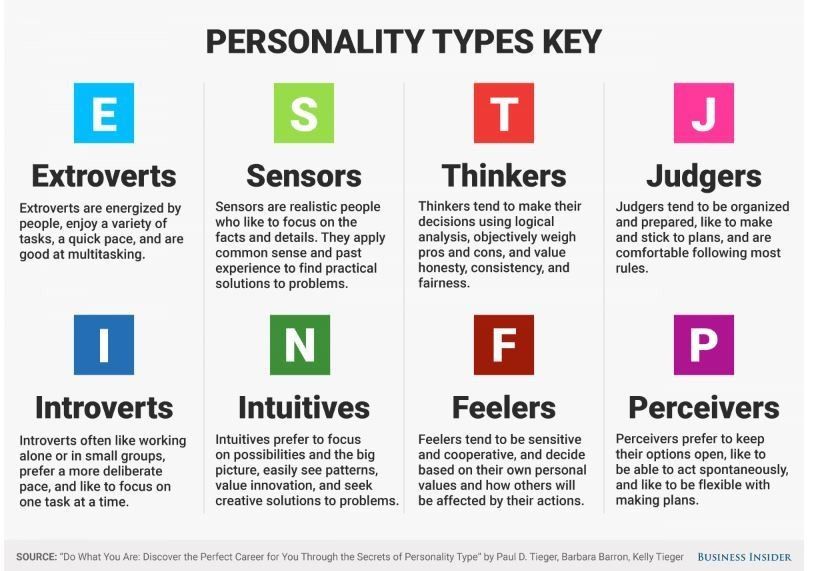 But this takes time. And if you're uncomfortable with new friends at first, don't beat yourself up, says writer Jenn Granneman. The more time you spend with them, the more comfortable you will feel.
But this takes time. And if you're uncomfortable with new friends at first, don't beat yourself up, says writer Jenn Granneman. The more time you spend with them, the more comfortable you will feel.
7. Be interested in people, ask questions
When we meet new people, we have to talk about ourselves, and every introvert is afraid of this. But the conversation doesn't have to be about you.
Jenn Granneman
Author of the book The Secret Life of Introverts. The art of survival in the "loud" world of extroverts.
Introverts have a superpower: to listen. So get the other person talking by asking them questions.
People love to talk about themselves and what they think. Give them a chance and occasionally answer their questions. nine0003
8. Use your strengths
Other people may like your character traits, behaviors, skills. Use it.
Study yourself, find out what you are good at. For example, you can be a great listener, compassionate and empathetic person, and your friends can count on your support and ability to keep secrets.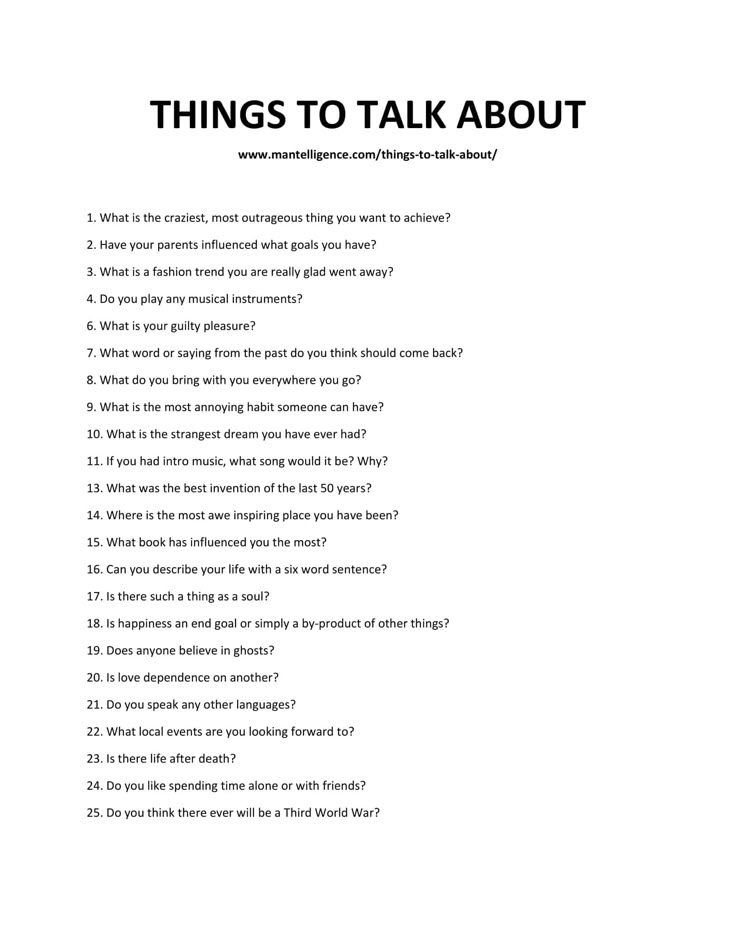
Your unique qualities may appeal to another introvert who recognizes you as a kindred spirit, or may complement the opposite traits of an extrovert. nine0003
9. Don't be afraid to try new things
If your current hobbies don't help you expand your social circle, look for new hobbies. You can start with what you have always been interested in: signing up for a dance class or a tour of your hometown, volunteering or participating in social events.
You don't need to talk to anyone for the first time if you feel uncomfortable. But if you like it, you can keep going to events and keep in touch with someone you've already met there. nine0003
We are often drawn to people with similar values and experiences, but don't be afraid to meet people who are different from you. Communication with them will help expand your horizons or even change your outlook on the world.
10. Look at people you already know
You don't have to look for friends among strangers.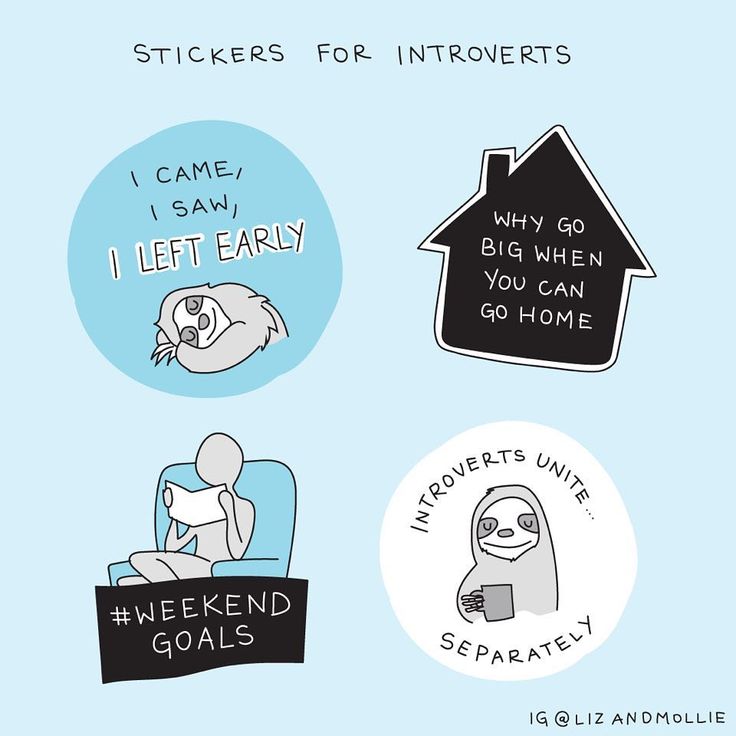 The author of books about introverts, Sophia Dembling, suggests paying attention to others: one of them may turn out to be an interesting person with similar hobbies and outlooks on life. nine0003
The author of books about introverts, Sophia Dembling, suggests paying attention to others: one of them may turn out to be an interesting person with similar hobbies and outlooks on life. nine0003
Maybe your colleague loves the same music as you and would love to accompany you to a concert. Or he reads just as much and is willing to share his collection of interesting books. Or maybe your former classmate is actually an interesting girl with whom you can talk about everything in the world? Look at people!
11. Be a little more persistent
If you want to make friends with someone, don't be afraid to take a risk and take the first step, write, start a conversation.
Sofia Dembling
Author of books about introverts.
What seems intrusive to you may seem friendly to others. Our sensitivity can work for us or against us. Don't be so sensitive as to be afraid to take risks. Be empathetic enough to know if it's worth stepping aside.
And do not be afraid of awkwardness in communication if it arises at first.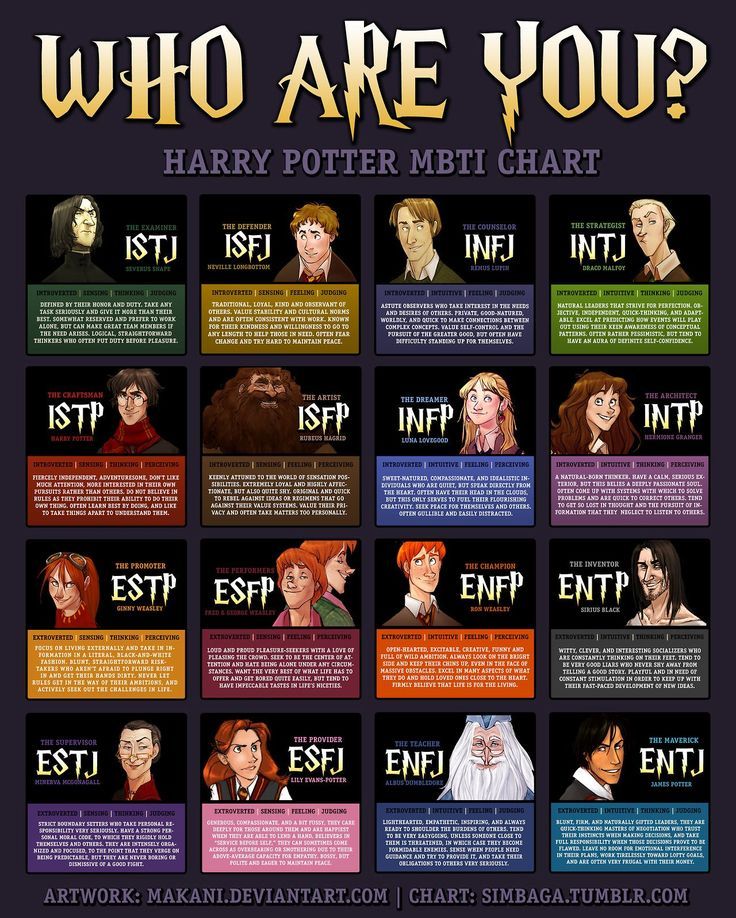 It does not characterize you or the other person in any way. It just happens at the beginning of a friendship. nine0003
It does not characterize you or the other person in any way. It just happens at the beginning of a friendship. nine0003
12. Don't chase the number
Psychologists believe that it doesn't really matter how many friends you have. What matters is how they suit you. Because the quality of relationships with people directly affects the feeling of happiness and satisfaction with life.
It may be enough for you to have a strong relationship with your family and one friend, get along with your colleagues and, if necessary, maintain a polite conversation. And if you're comfortable with that, fine. In the end, it's better to have one but a good friend than to gather a crowd of acquaintances for whom you have neither time nor energy. nine0003
13. Practice communication, but don't overdo it
To improve your ability to interact with other people, communicate with them. However, you do not need to be socially active all the time. Don't spend too much time with your friends if it causes you stress.